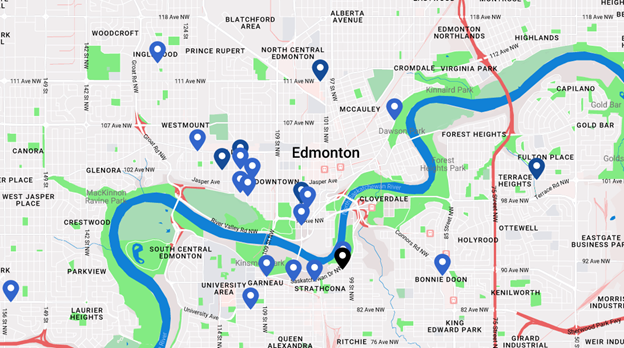
How Do I Rent an Apartment in Canada as a Newcomer?
Are you embarking on a new journey in Canada and finding yourself navigating the maze of renting a home?
Whether you're a student, a skilled worker, here on a working holiday visa, or a new immigrant, securing a place to call home is a crucial step in settling into your new life. Canada offers diverse housing options, but understanding the rental process can be overwhelming, especially if you're new to Canada's rental practices and regulations.
Fear not, as this blog aims to be your compass, guiding you through the intricacies of renting a home in Canada. From understanding rental agreements to navigating the rental market, we'll equip you with the knowledge and tools you need to find the perfect place to begin your Canadian adventure.
How to rent an apartment in Canada as a newcomer
If you're brand new to Canada, there are a few things you must do before you can rent an apartment. It would help if you first decide where in Canada you want to live. Canada offers a lot of different employment options and communities for newcomers to choose from. So, you must do your research before obtaining an apartment.
Research the local housing market
Begin by researching the housing market in the area where you intend to live. Understand the average rental prices, popular neighborhoods, and amenities available. It is always best to spend some time in the city and the area; this is the perfect way to get a feel for the public transportation options, amenities, local businesses, and if it's close to employment opportunities.
Set your rental budget
Determine your budget for rent and other associated costs such as utilities, insurance, and potential deposits. Most apartments for rent in Canada will require the renter to put down a deposit, which usually amounts to the price of one month's rent. Ensure that your budget is realistic and considers your other financial obligations.
Different cities in Canada will have different rental markets. For example, Toronto and Vancouver have higher rental costs than Regina and Edmonton. This is important to keep in mind when budgeting and deciding on the right Canadian city for you.
It is also essential to determine whether you will need a car. If you decide to live in the inner city, you can rely on public transportation. But if you live in a more rural or suburban area, you may want to budget to include expenses that come along with a vehicle.
Gather necessary documents
Prepare necessary documents that landlords or property management companies may require for rental applications. This typically includes proof of identity (such as a passport or visa), proof of income or employment, and references from previous landlords.
It is also essential to determine how you want to pay your rent. In many cases, you must have a Canadian bank account to pay your landlord or property management company. Fewer and fewer landlords or property managers will accept cheques, cash, or credit cards. Most common ways in Canada to pay rent will be a bank e-transfer, auto-deposit, or through a secure online payment portal.
Search for rental listings

Now that you've chosen a city, set a budget, and sorted all your documents, you can search for available apartments for rent.
Start searching for rental listings through various sources, such as online rental platforms, real estate agencies, classified ads, and social media groups. You can now begin to narrow down your options based on your apartment unit preferences, apartment building preferences, location, and budget.
The safest way to find an apartment for rent, and avoid rental scams, would be to search directly with property management websites. For example, on bwalk.com, the only apartments listed are those directly owned and controlled by Boardwalk.
This contrasts rentals.ca, rentfaster.ca, or Craigslist, where anyone can upload an apartment for rent. These sites are still great resources, but they can put more vulnerable renters at risk of fraudulent listings.
Schedule apartment viewings
Once you've identified potential rental properties, schedule viewings to inspect the apartments personally. When viewing apartments, bring your apartment checklist with you, and make sure to pay attention to factors such as location, size, condition, amenities, and proximity to transportation and essential services.
Submit a rental application
If you find an affordable apartment that meets your needs and hopefully all your wants, it’s time to submit a rental application to the landlord or property manager. Complete all required paperwork accurately and provide any additional information or documentation requested.
Review the apartment lease agreement

Carefully review the lease agreement before signing. Pay close attention to clauses regarding rent, lease duration, security deposits, maintenance responsibilities, and any rules or restrictions.
Set up utilities and services
Does the unit include any utilities? In most Canadian provinces, utilities include water, gas/heat, electricity, internet, and cable TV (if desired).
Some apartments will include utilities in the rent price, while others will not have any utilities in the rent price. If you find a rental apartment at the top of your budget that does not include utilities, you should consider that utilities might cost a few hundred dollars monthly.
Prior to moving in, arrange for the setup of essential utilities and services that you, as the renter, are responsible for. Ensure that these services are activated in your name and that you understand how to manage ongoing payments.
Boardwalk apartments include water and heat in the rent price. Our residents manage their unit's electricity and the internet, allowing them to select their preferred provider, terms, and length of service. For example, if you obtain internet and cable TV from Telus, the contract will be in your name, allowing you to control the service when you move out of the rental unit or want to switch providers.
Finding student housing as an international student
When looking for student housing in Canada as an international student, there are several important factors to consider to ensure a comfortable and suitable living arrangement. Here are some key considerations:
- Proximity to Campus: Choose student housing that is conveniently located near your university or post-secondary institution's campus.
- Budget: Remember that the cost of living may vary depending on the city or province, so research average rental prices in the area.
- Safety and Security: Consider secure entry systems, well-lit common areas, and proximity to emergency services.
- Amenities and Facilities: Evaluate the amenities and facilities offered by potential student housing options.
- Roommate Preferences: Decide whether you prefer to live alone or with roommates.
- Lease Terms and Conditions: Consider factors such as lease duration, rent payment schedules, deposit requirements, and rules regarding subletting and lease termination.
- Transportation Options: Evaluate access to public transportation routes, bike paths, and walking distances to campus, grocery stores, and other essential destinations.
- Cultural and Community Support: Look for student housing options that offer cultural and community support services tailored to international students.
- Legal Rights and Responsibilities: Familiarize yourself with the legal rights and responsibilities tenants have in Canada.
- Accessibility and Inclusivity: Consider factors such as wheelchair accessibility, language support services, and accommodations for religious or cultural practices.
Can I buy a home as a Canadian Immigrant?

If you’re interested in purchasing a home as a newcomer to Canada, there are a few things to keep in mind.
The Non-Canadians Residential Property Purchase Prohibition Act, enacted by Parliament in June 2022 and implemented in January 2023, may impact new immigrants seeking housing.
This legislation, aimed at easing the strain on the real estate market and enhancing housing affordability, imposes a temporary ban on foreign homebuyers. Effective for two years, the ban restricts non-Canadians and foreign corporations from acquiring residential properties.
However, if you’ve obtained permanent residency status or have completed your citizenship, you are exempt from the ban. There are also additional exceptions for refugees who arrived due to an international crisis, international students who have been permanently living in Canada for 5 years, consulate staff, and other permit holders who have paid 3 or more years of taxes.
Finding a home in Canada: Welcome! Bienvenue!
When moving to Canada for the first time, remember you're not alone in this journey. Seek support from community organizations, fellow newcomers, and online resources to help you confidently navigate the rental process.
With patience, perseverance, and a proactive approach, renting an apartment in Canada as a newcomer can be a rewarding step towards building a bright future in your new home. Boardwalk is here to help you find affordable apartments for rent in Canada, whether you're a student, refugee, family, retiree, or adventure seeker. We would love to help you discover your perfect rental unit in one of our many communities nationwide. Get in touch with our team today and make sure to explore our apartments for rent.
